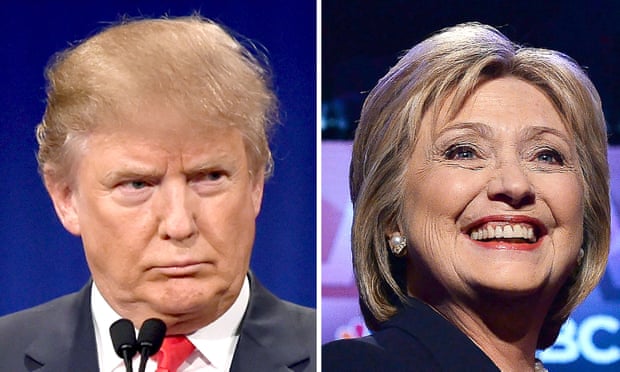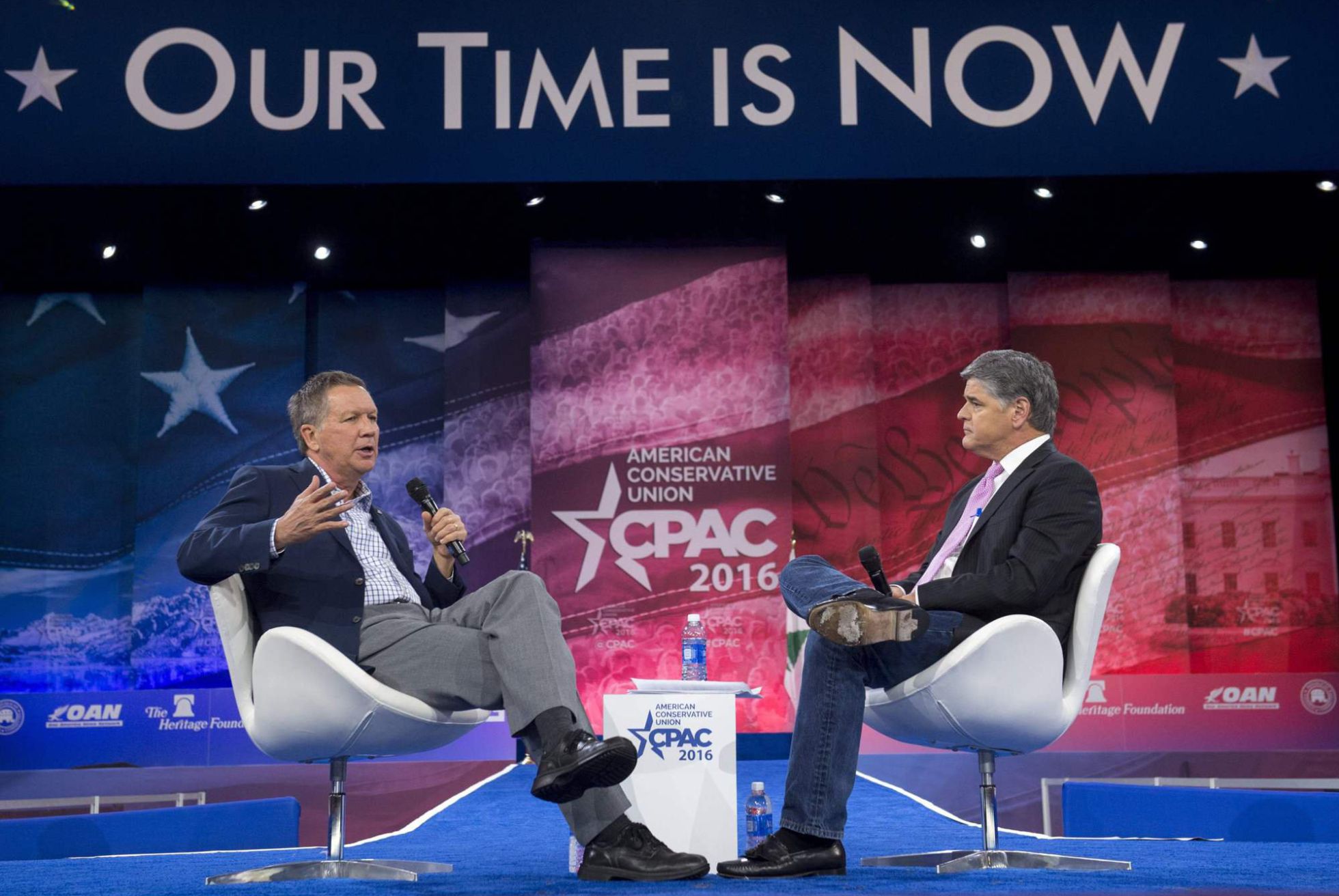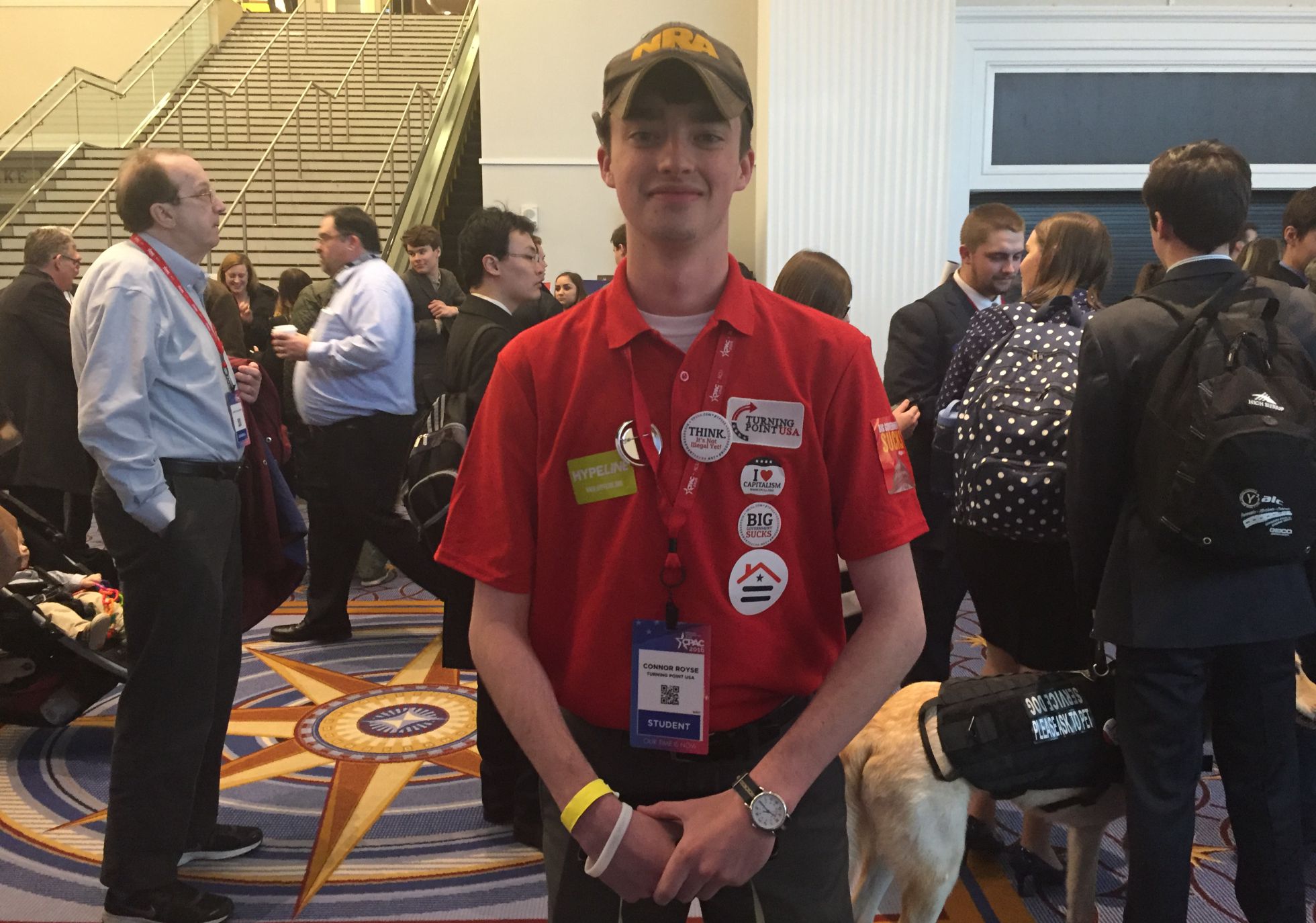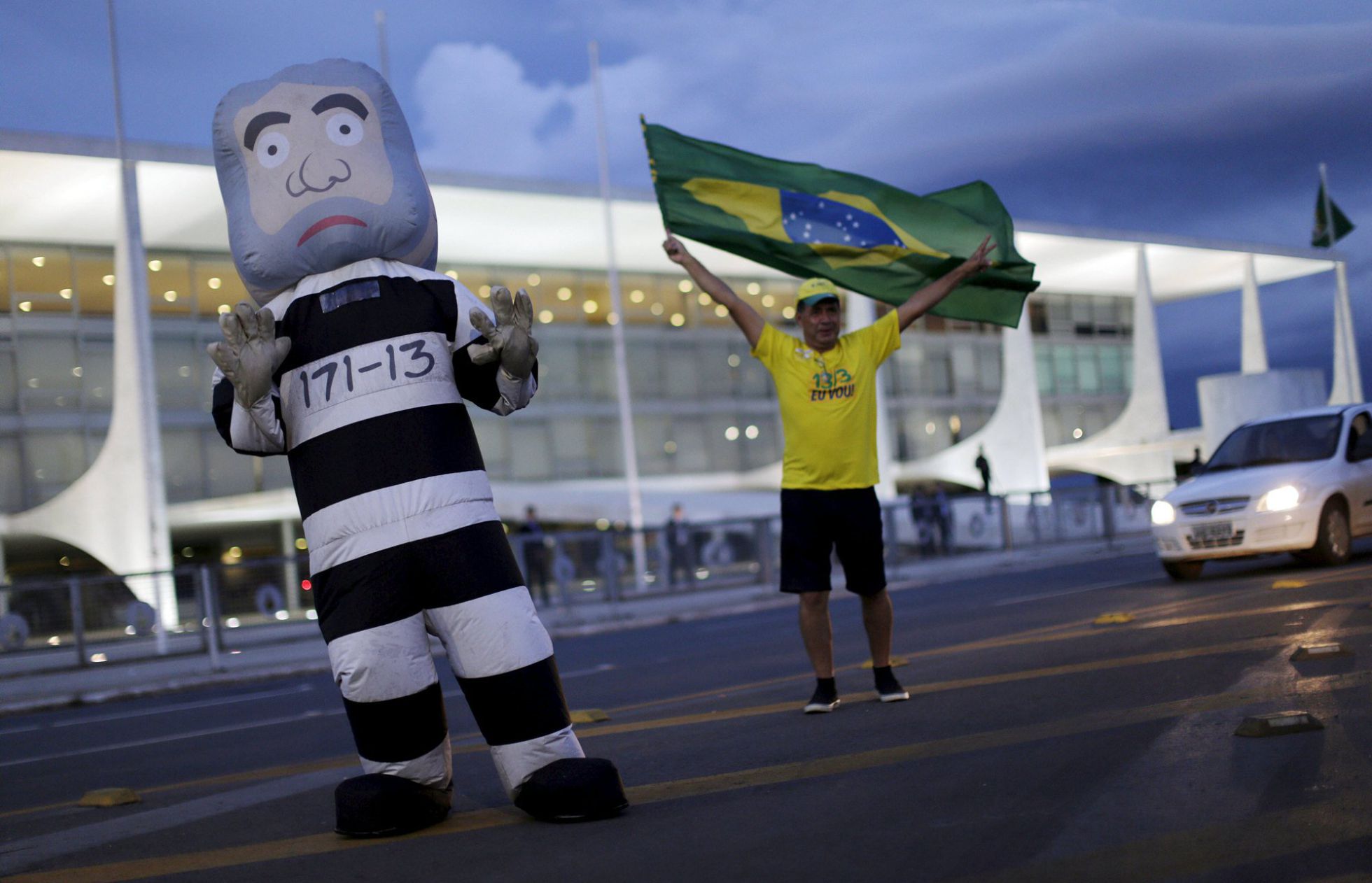Saturday 5 March 2016
Barring an unforeseen disaster on either side, David Smith on
how the two frontrunners are now on a collision course for the presidential
election.
David Smith in Washington/THE GUARDIAN
Donald Trump and Hillary Clinton took a big leap toward clinching their parties’ nomination for the US presidential election, soundly defeating rivals in a slew of Super Tuesday primaries this week. Photograph: DSK/AFP/Getty Images
In his gilded age mansion
by the sea, once intended as a winter White House for presidents craving
Florida sun, Donald Trump watched television intently. News networks were
calling state after state for him in the Super Tuesday primary votes for the
Republican nomination. Then they cut to what was in effect a victory speech by Hillary
Clinton.
The exultant Democrat
voiced the deep frustration of millions of Americans whose incomes have
stagnated, including “struggling rust belt communities and small towns that
have been hollowed out by lost jobs and lost hope”. Minutes later Trump walked out to face the
world’s media in a ballroom dripping in gold leaf, bedecked
with three giant chandeliers and four white cherubs. Clinton had been in
government with Barack Obama for a long time, he said. “Why hasn’t she done
anything about it?”
The first shot in the duel
to become 45th president of the United States had been fired.
Barring an unforeseen
disaster on either side, Clinton and Trump are now on a collision course for
the presidential election on 8 November 2016.Each won seven states on the biggest day of
the campaign calendar so far. Democrat Clinton has apparently seen off the
insurgent challenge of socialist Bernie Sanders but, among Republicans, it is
the outsider who has staged a hostile
takeover: having toppled the Bush dynasty, Trump enjoys a commanding lead over
senators Ted Cruz and Marco Rubio.
The bombastic, swaggering,
sometimes vulgar billionaire has stunned the political world, plunged the
Republican party into civil war and, among the pundit class, relegated the
prospect of the 240-year-old republic’s first female president to a footnote.
His success has also unmasked a Disunited States wracked by fear and anger and
fractured by class, culture, race and educational attainment. The outside
world, overjoyed by the election of America’s first black president just eight
years ago, is asking: how did it come to this?
Clinton versus Trump has
all the makings of a rambunctious, vicious clash of styles. One is a former first
lady, senator and secretary of state, a measured planner who appeals to the
head but leaves some voters cold. The other is a brash tycoon and reality TV
star who appeals to the heart by, in the words of many supporters, “cutting
through bullshit” and “telling it like it is”. When the two come to debate, it
will be an Olympic boxer versus a street fighter or, according to one Clinton
friend quoted by The Hill
website, “the smartest person in the room against the class clown”.
This is unchartered
territory, even in a nation that has elected actors Ronald Reagan as president
and Arnold Schwarzenegger as a governor. George Ajjan, a Republican strategist and consultant, said:
“There’s no precedent for a head-to-head matchup between a traditional
politician and a purely private sector tycoon on the national stage - let alone
one who had his own top-rated TV show. But whether Trump’s campaign can provide
enough substance and rigour to compete at a presidential level, or [will]
collapse under the weight of its own bombast, remains to be seen.”
It is also a struggle
between two discordant visions. Clinton has cast herself as the continuity
candidate, in effect offering a third term of Barack Obama, albeit with some
concessions to Sanders’s enthusiastic support on her left flank. Trump is all
over the map, but has styled himself as a conservative and caused outrage with
proposals to build a wall on the Mexican
border and temporarily ban Muslims from entering the country.
The criticism he
offered last Tuesdayoffers a foretaste of a line of attack against
Clinton that has served him so well already in the campaign. Pointing to her
time in the White House and the State Department, it is safe to assume he will
portray her as the ultimate establishment figure to an electorate feeling
betrayed by Washington. This will include an “abysmal” spell as America’s top
diplomat, the lingering stench around her use of a private email server and,
going further back, her husband’s scandalous entanglement with Monica Lewinsky.
Moreover, where Clinton
offers hard-baked policies, Trump will play on the great man theory of history:
trust him, his charisma, force of personality and entrepreneurial spirit can
“make America great again”. His choice of venue for Super Tuesday spoke
volumes. Built from Dorian stone shipped from Genoa, Mar-a-Lago in Palm
Beach was opened in 1927 as a private estate by one of the richest women
in the world, Marjorie Merriweather Post, and donated to the US government in
1973 for use as the winter White House.
Trump bought the
128-room home in 1985 after typically aggressive wheeling and
dealing. He added a Louis XIV-style ballroom with $7m worth of gold leaf on the
walls and spent $100,000 on four gold-plated bathroom sinks. Michael Jackson
stayed here and, when Trump married Melania Knauss at the venue, guests
included Hillary Clinton. The swimming pool, beauty salon, spa, tennis courts
and croquet court shout aspiration, wealth and success, a version of the
American dream.
Mar-a-Lago invites
comparisons with Xanadu, the palatial Florida retreat of Citizen Kane, the
ego-driven newspaper magnate played by Orson Welles in the 1941 film. It
reinforces the pitch that Trump is a winner like Kane, not a loser like Willy
Loman in Arthur Miller’s Death of a Salesman. Whereas Kane’s campaign for the
US presidency is ultimately derailed by adultery, thrice married Trump’s
private life appears bulletproof in the age of celebrity. Perhaps the key to the
former Apprentice host’s popularity lies in an observation made by President
Calvin Coolidge in January 1925: “The chief business of the American people is
business.”
Trump told the latest
issue of Time magazine: “I am the most successful person ever to run for
president. I built an incredible business ... I go on one of these shows and
the ratings double. They triple. And that gives you power. It’s not the polls.
It’s the ratings ... I have always been a winner. If we have the delegates at
the convention, there is nothing they can do about it ... I am the last person
on Earth [Clinton] wants to run against.”
But the bully, showman,
party crasher and demagogue – as Time’s cover put it – is also the last person
many Republicans want to see at the top of the ticket, though arch conservative
Cruz comes close. In the past week alone, the previous two Republican nominees,
Mitt Romney and John McCain, have launched
unprecedented attacks on everything from Trump’s business records
to his national security credentials. Numerous others have joined a #NeverTrump
campaign and sworn that they cannot support Trump as the party’s standard
bearer.
The morning after Super
Tuesday, as smoke rose from the wreckage, MSNBC television host Brian Williams
told viewers: “The Republican party is facing an existential crisis. We’re
covering a moving history lesson.”
The passengers are cheering
for the guy who took over the plane
By thumbing his nose at the
party elite, who waited too long to take him seriously, Trump has energised
millions of people who usually do not vote or who are sick of electing
Republicans to Congress only to find no change in their daily lives. Political
biographer Jon Meacham told MSNBC: “Trump
has managed to hijack an entire political party, and the pilots are asking why
no one is on their side. The passengers are cheering for the guy who took over
the plane.”
One such passenger is John
Schlegel, a retired manager and Vietnam war veteran. “Donald Trump has touched
a nerve,” he said. “I think he’s got America thinking again and speaking about
things again that weren’t speakable until Trump started the dialogue. He’s
saying a lot of things that people have got on their mind but are not secure
enough in speaking them themselves, but they’re coming out now.”
Schlegel, 68, from Clinton,
Ohio, added: “I think the Republican establishment is screwing the pooch when
they turn on Trump. He’s the only one of them that has a chance against Hillary Clinton. I hope he wins and throws
the whole establishment on their ear. They’re a bunch of spoiled kids right
now: they’re not getting exactly what they want when they want it, so they’re
trying to actually shoot themselves in the foot.”
Analysts suggest that the
Republicans are reaping the whirlwind of a split between conservatives and
moderates dating back to the 1950s, and a purge of moderates in the 1990s. Heather Cox Richardson, an academic at Boston
College and author of To Make Men Free, a history of the Republican party,
said: “The establishment has lost control of the beast they created through
their own rhetoric and there’s no way they’re going to get it back, whatever
Romney says.”
Richardson predicted that
the race will only turn uglier in the build-up to July’s Republican convention,
where the east coast, country club old guard could yet try to block Trump at
the risk of a popular revolt: host city Cleveland is reportedly buying 2,000
sets of riot gear in preparation. “The potential for violence in Cleveland is
high,” Richardson said. “Political violence in American history is high, though
we tend to break it off and call it other things.”
There have been ominous
incidents of black people being
pushed, shoved and ejected from Trump rallies dominated by a white
working class hollering with the partisan passion of sports fans. Pre- and
post-election violence is usually seen as a phenomenon of Middle Eastern and African countries, yet in the wake of riots
in Ferguson and other cities, Richardson believes America is playing with fire.
“You can look at the fury
that Trump and Cruz have incited, aided and abetted by Congress, and where is
it going to go?” she asked. “Even if Trump is elected, he cannot produce what
he promised. He has a lot of angry people and I don’t see where it goes apart
from rioting.”
On Friday Cruz told the
Conservative Political Action Conference near Washington that the Republican
establishment would be making a huge mistake if delegates subvert the popular
will on the floor of the convention. “If that happens, we will have a manifest
revolt on our hands all across this country.”
But if Trump does manage to
become the Republican nominee, he will still find standing in his way the
formidable battle-tested Clinton machine. Some Democrats believe she would beat
Trump by a landslide, the New York Times
reported last week, not least because his comments about immigrants
and Muslims would alienate the African American and Hispanic voters who have
proved to be Clinton’s firewall against Sanders. But Bill Clinton reportedly
warned that Trump has a keen sense of the electorate’s mood and should be
underestimated at the Democrats’ peril.
Dannel Malloy, the governor of
Connecticut, told the New York Times: “He’s formidable, he understands voters’
anxieties, and he will be ruthless against Hillary Clinton. I’ve gone from
denial — ‘I can’t believe anyone would listen to this guy’ — to admiration, in
the sense that he’s figured out how to capture everyone’s angst, to real
worry.”
Indeed, one chilling
statistic for Clinton stands out: more than 8m voters
took part in the Republican Super Tuesday contests, while the Democratic
turnout was around 5.5m. This is an almost exact reversal of the figures in
2008. Obama and Trump have absolutely nothing in common except their power to
enthuse. What Clinton and Trump share is a power to inspire hatred and mobilise
votes not for themselves but against each other. “Hope and change, not so
much,” former Obama campaign manager David Plouffe said, referring to the
coming Clinton campaign. “More like hate and castrate.”
Clinton will be desperate
to make peace with Sanders’s impassioned supporters, especially millennials,
but it remains difficult to imagine her inspiring Obama-style fervour at the
polls. Her strategy is likely to involve attack ads that highlight Trump’s
misogynistic and xenophobic statements and question whether his temperament is
suitable for commander in chief. Rich Galen, former press secretary to
vice-president Dan Quayle and House speaker Newt Gingrich, said: “If I was
advising the Clintons, I’d go back to that [2008] ‘Who do you want toanswer the phone at three in the
morning?’ ad. Is this the guy you want going toe to toe with
Assad? It’s one thing to make war; making peace is much harder.
“On the other hand, Trump
gets to say she was Secretary of State during some of the worst foreign policy
years in the country’s history. In a debate it would be pretty much a draw.
They both have great presentational skills. It will be fun to watch.”
Galen acknowledged the
crisis facing the Republican party and his own culpability. “I bear my part of
the responsibility for getting it there. I work inside the Beltway. The words
have come out out my mouth: ‘I know how to do this better than you know how to
do it.’ The message my generation was offering has clearly run its course. I wasn’t smart enough to get that.”
5 issues that will define
the race
Tone and vision
Trump is tapping into fear
and anger; Clinton says America needs “love and kindness”. Trump’s campaign
slogan is “make America great again”; Clinton insists: “America never stopped
being great. We have to make America whole.” Trump has vowed to build walls;
Clinton has promised to break down barriers. Trump is a New Yorker with a
liberal past on issues such as abortion that worries some conservatives;
Clinton is a former New York senator with political baggage and under pressure
to appease the Sanders left. Clinton is compared to Bill Clinton and Barack
Obama; Trump is compared to everyone from Benito Mussolini to Juan Perón to
Silvio Berlusconi.
Jobs and wages
“The economy, stupid,” was
campaign strategist James Carville’s phrase for Bill Clinton’s successful 1992
presidential campaign against president George H W Bush. Although unemployment
is below 5%, it is now received wisdom that the slow rate of wage growth
incubated the frustration and resentment that powers Trump’s campaign. Clinton
may do better to associate herself with her husband’s 1990s achievements than
the Obama post-2009 recovery. Trump says China, Japan and
Mexico are “killing us” on free trade and he will bring jobs back to
America.
National security
Clinton boasts experience
but Sanders raised questions over her judgment: she admitted making a mistake
in backing the Iraq war and, as Secretary of State, inmasterminding the
overthrow of Muammar Gaddafi in Libya, now in
chaos. Then there is the saga of her private email server, under investigation
by the FBI. Trump has been fiercely criticised for lack of expertise and
statements advocating torture, cosying up to Vladimir Putin, being neutral on
Israel-Palestine and bombing the wives and children of terrorists. There have
been suggestions that the military might disobey his orders.
Immigration
The signature plan of Trump’s that everyone knows is the building of a wall along the Mexican border that he insists that Mexico will pay for (Mexicans say forget it). He has also declared that he will deport 11 million illegal immigrants, which opponents say is both heartless and impractical. Clinton has called for comprehensive reform with a path to full and equal citizenship as well as closing private immigrant detention centres. She is expected to trounce Trump among Hispanic voters and benefit from American’s changing demographics. In 1980, Ronald Reagan took 56% of the white vote and won by 10 points; in 2012, Mitt Romney won the white vote by 59% and lost.
The signature plan of Trump’s that everyone knows is the building of a wall along the Mexican border that he insists that Mexico will pay for (Mexicans say forget it). He has also declared that he will deport 11 million illegal immigrants, which opponents say is both heartless and impractical. Clinton has called for comprehensive reform with a path to full and equal citizenship as well as closing private immigrant detention centres. She is expected to trounce Trump among Hispanic voters and benefit from American’s changing demographics. In 1980, Ronald Reagan took 56% of the white vote and won by 10 points; in 2012, Mitt Romney won the white vote by 59% and lost.
Gun control
Clinton has vowed to take
on the gun lobby, just as her husband and Obama did, with varying degrees of
success. She has pledged to enforce comprehensive
background checks, crack down on illegal gun traffickers, hold dealers and
manufacturers accountable “when they endanger Americans” and keep guns out of
the hands of domestic abusers and stalkers. Trump has said he owns a firearm
and will defend the second amendment and roll back Obama’s recent executive
actions. “Gun and magazine bans are a total failure,” his manifesto says.




